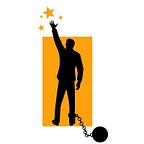Prison Is Just a Continuation of ‘Thug Life’ — with the Guards Among the Worst
Were we sent to prison for rehabilitation or retaliation?
By Robert Barton
“I’m sure glad I was in the hole.”
Did I just think that? For the uninitiated, the “hole” is solitary confinement — what prison administrators call the “special housing unit,” or SHU (because bureaucrats everywhere seem to like euphemisms, so they can fool themselves into thinking they aren’t being cruel). Let me explain just what that is: You’re alone in what is basically a box, with no access to phone, email or TV — just a crank-operated radio (no batteries allowed). Newspapers and magazines are banned; the only book you can read is what they decide to hand out. This time, I was stuck with romance novels. As for hygiene, the prison-issued soap dries your skin into sandpaper, and the permissible toothbrush is a finger “sleeve” with a few bristles.
And yet:
“I’m sure glad I was in the hole.”
I’d been sent there with my cellie when he was caught with a knife. In accordance with policy, we both were sent to the SHU until the disciplinary hearing, where he took responsibility. [Unfortunately, I am unable to choose who I live with or what my cellie does.] He got 30 days and, 12 days later, I was sent back to general population.
I exited to the news that a shakedown crew had just rampaged through the unit, destroying everything in their path. And that’s why I was relieved to have been locked away in what others would see as hell. At least my property had been stowed away while I was gone, safe from the marauders.
A fellow prisoner had assaulted one of the prison staff, and a group of officers were intent on seeking revenge. When one of my tier mates asked why, the response was, “What would you do if someone stabbed one of your homies? Hit us, we hit back. Retaliation is what it’s all about, right?”
These aren’t the words you’d expect to hear from a government professional. Rather, they are the thinking of a common street thug. I know the mindset because I recognize it. As a former fellow prisoner explained in a previous post, “A lot of the stuff that goes down on the street stems from a belief system that says if X happens, you have to do Z.” In other words, you slight my homie, I have to strike back. In that way, prison is just like the hood, with the officers perpetuating a never-ending cycle of revenge. (Prisoners do it too; but do we not have a right to expect more of the people given power over us? We need help overcoming these patterns, not reinforcement!)
So, instead of dealing with the individual who assaulted the officer according to the rules, the COs beat him close to death with night sticks. Then they drove home the message that we better not mess with them by terrorizing the rest of us, shaking the unit down and destroying everything of value. Radios and MP3 players were broken. My neighbor’s pictures of his daughter and her mother were ripped from his photo album and torn up. Legal documents (hundreds of unnumbered pages) were tossed in the air. Batteries were confiscated so the radios that housed them were no longer operable. (During lockdown, radios are our sole connection to the outside world, our only reprieve from monotony.) “Comforts” purchased with hoarded commissary money (blankets, clothes, food) were confiscated. (A bologna/cheese sandwich and peanut butter is distributed for both lunch and dinner during lockdown; whatever extra you can get from the commissary is “gold.”)
All this happens under the sanction of the prison administration, which claims that the shakedowns are necessary for “security measures.” But it’s really just brazen, raw-knuckled retaliation. After all, think about it: When a prisoner attacks an officer or stabs another inmate, he is already prepared to go to the hole. So, it doesn’t matter to him whether the rest of the institution goes on lockdown. Just what is being “secured”?
It’s all about culture. Federal prison officers function just like a gang, and a gang must have an adversary. And we’re it. Prison is an us vs them place, which isn’t conducive to rehabilitation. What kind of lesson does this teach us?
The culture of the federal Bureau of Prisons must be investigated and changed, beginning at the top. Most prisoners will eventually be released to the outside world. If we want to be whole, healthy people, rather than battered and traumatized, when we return to our communities, this must stop!
